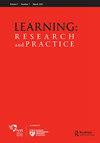Emerging understandings of mindfulness through experiential awareness
Q2 Social Sciences
引用次数: 6
Abstract
ABSTRACT Mindfulness practices are increasingly used in classrooms to enhance the well-being dimensions of learning environments. New Zealand policy documents draw on a bicultural perspective that promotes a holistic framing of well-being. This paper will consider the transformative possibilities of a mindfulness-based breathing intervention in two New Zealand classrooms of students aged between 10 and 12 years old. Operational definitions of mindfulness include awareness of emotional, cognitive, and physical experiences rather than a focus on a state of mind. Using authentic inquiry, we draw on multi-theoretical and multi-methodological perspectives to explore observing/noticing/attending to sensations/perceptions/thoughts/feelings associated with a classroom mindfulness intervention. Specifically, we examine students’ increased awareness and evolving understandings of mind | body connections that emerged during cogenerative dialoguing. We found that students puzzled over whether it is possible to separate physical, mental and emotional states. We consider the implications of the mindfulness-breathing intervention in generating participants’ insights into well-being and wellness.通过体验性意识来理解正念
正念练习越来越多地用于课堂,以提高学习环境的幸福维度。新西兰的政策文件借鉴了双文化视角,促进了福祉的整体框架。本文将考虑在两个新西兰教室的学生年龄在10到12岁之间的正念为基础的呼吸干预的变革可能性。正念的操作性定义包括对情感、认知和身体体验的意识,而不是对精神状态的关注。使用真实的调查,我们利用多理论和多方法的观点来探索观察/注意/关注与课堂正念干预相关的感觉/感知/思想/感受。具体来说,我们研究了学生在共同生成对话中出现的对身心联系的增强意识和不断发展的理解。我们发现,学生们对是否有可能将身体、精神和情绪状态分开感到困惑。我们考虑了正念呼吸干预在产生参与者对幸福和健康的见解方面的影响。
本文章由计算机程序翻译,如有差异,请以英文原文为准。
求助全文
约1分钟内获得全文
求助全文

 求助内容:
求助内容: 应助结果提醒方式:
应助结果提醒方式:


